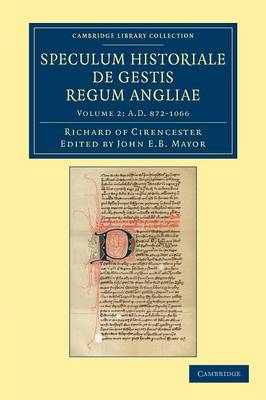Cambridge Library Collection - Rolls
2 primary works • 4 total works
Volume 1
Ricardi de Cirencestria speculum historiale de gestis regum Angliae: Volume 1, AD 447-871
by Richard Of Cirencester
Published 15 November 2012
Richard of Cirencester (c.1335-1400) wrote his Latin history of the deeds of the English kings while he was a Benedictine monk at St Peter's, Westminster. His work is largely unoriginal and derivative of other historians, but it does contain valuable information about Westminster Abbey, as well as a full account of the saints whose tombs were to be seen in the abbey church. The fourth (and last) book concentrates solely on the reign and deeds of Edward the Confessor. Although Richard expresses an intention to continue his story in a fifth book, beginning with William the Conqueror, there is no evidence that he ever did so. This first volume of a two-volume work, edited by the scholar John Eyton Bickersteth Mayor (1825-1910) and published in 1863, covers the period from the legendary accession of Vortigern in 447 up to the death of Ethelred of Wessex in 871.
Volume 2
Ricardi de Cirencestria speculum historiale de gestis regum Angliae
by Richard and John E B Mayor
Published 15 November 2012
Richard of Cirencester (c.1335–1400) wrote his Latin history of the deeds of the English kings while he was a Benedictine monk at St Peter's, Westminster. His work is largely unoriginal and derivative of other historians, but it does contain valuable information about Westminster Abbey, as well as a full account of the saints whose tombs were to be seen in the abbey church. The fourth (and last) book concentrates solely on the reign and deeds of Edward the Confessor. Although Richard expresses an intention to continue his story in a fifth book, beginning with William the Conqueror, there is no evidence that he ever did so. This second volume, published in 1869, includes a lengthy preface by editor John Eyton Bickersteth Mayor (1825–1910) in which he discusses the work De situ Britanniae, once attributed to Richard, and establishes that it is in fact an eighteenth-century forgery.
Ricardi de Cirencestria speculum historiale de gestis regum Angliae 2 Volume Set
by Richard Of Cirencester and John E B Mayor
Published 15 November 2012
Richard of Cirencester (c.1335-1400) wrote his Latin history of the deeds of the English kings while he was a Benedictine monk at St Peter's, Westminster. His work is largely unoriginal and derivative of other historians, but it does contain valuable information about Westminster Abbey, as well as a full account of the saints whose tombs were to be seen in the abbey church. The fourth (and last) book concentrates solely on the reign and deeds of Edward the Confessor. Although Richard expresses an intention to continue his story in a fifth book, beginning with William the Conqueror, there is no evidence that he ever did so. This two-volume work, edited by the scholar John Eyton Bickersteth Mayor (1825-1910) and published between 1863 and 1869, covers the period from the legendary accession of Vortigern in 447 up to 1066.
Ricardi de Cirencestria speculum historiale de gestis regum Angliae: Volume 2, AD 872-1066
by Richard Of Cirencester and John E B Mayor
Published 5 November 2013
Richard of Cirencester (c.1335-1400) wrote his Latin history of the deeds of the English kings while he was a Benedictine monk at St Peter's, Westminster. His work is largely unoriginal and derivative of other historians, but it does contain valuable information about Westminster Abbey, as well as a full account of the saints whose tombs were to be seen in the abbey church. The fourth (and last) book concentrates solely on the reign and deeds of Edward the Confessor. Although Richard expresses an intention to continue his story in a fifth book, beginning with William the Conqueror, there is no evidence that he ever did so. This second volume, published in 1869, includes a lengthy preface by editor John Eyton Bickersteth Mayor (1825-1910) in which he discusses the work De situ Britanniae, once attributed to Richard, and establishes that it is in fact an eighteenth-century forgery.

